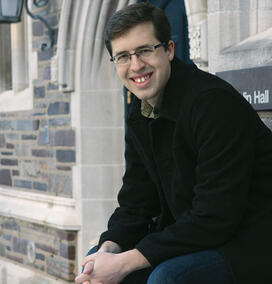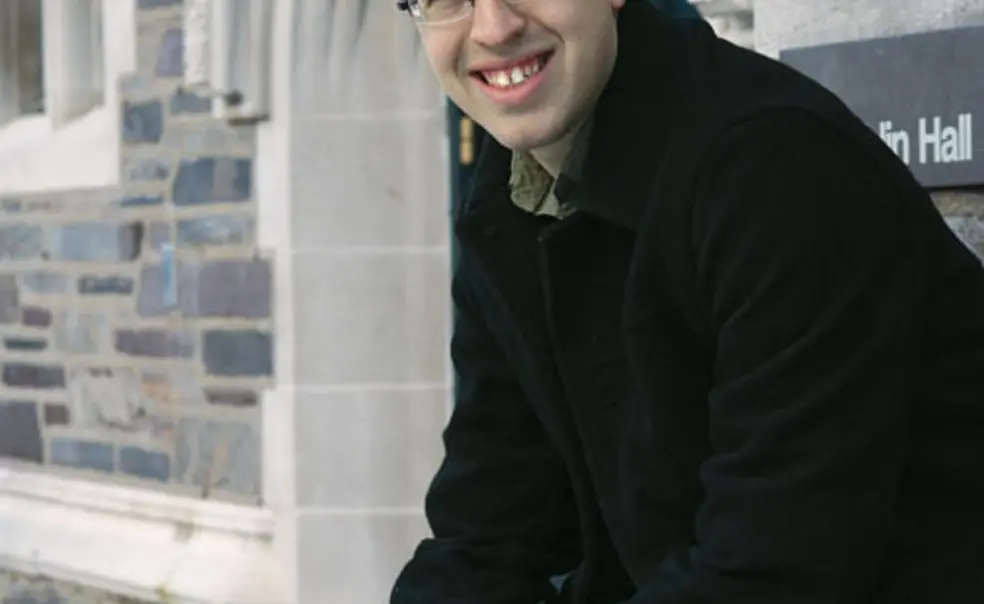Princeton trails Ivy peers in enrollment of veterans

In many respects, Joshua Haecker ’13 is like most Princeton undergraduates. As he rushes to Frist Campus Center on a recent Tuesday, he’s thinking about academics (his upcoming midterms), extracurriculars (he’s a vice president of Triangle), and meeting up with his girlfriend.
But the fresh-faced Haecker stands out in one respect. He is a U.S. Army veteran who spent six years based in Germany as an intelligence analyst before arriving on campus. In fact, he is the only known U.S. veteran currently in the undergraduate student body (there may be others who have not identified themselves to the University’s administration).
Princeton has the lowest number of undergraduate veterans in the Ivy League. Figures at other institutions vary widely — at Brown, Dartmouth, and Yale the number is in the single digits, while Cornell has 63 veterans and Columbia has 247. Some alumni and professors say Princeton has not done enough to promote itself to veterans. The administration says the University would like to have more veterans and is working on the issue.
“We want [veterans] to come to Princeton,” Dean of Admission Janet Rapelye said. “We are working hard to encourage more veterans to apply to Princeton. This past year we admitted some veterans, and they chose to go elsewhere.” She said her office has been “working with several organizations to get information to those retiring from duty,” especially about Princeton’s financial-aid program. There also are four veterans in the graduate programs at the Woodrow Wilson School, along with 11 active-duty military members.
Haecker, 28, said he’s very happy with his experience at the University, but Princeton “could do a better job making it obvious it’s a good place for veterans.” A Wilson School major, Haecker plans to work for the federal government after graduation.
Wick Sloane, an English professor in Boston who tracks the attendance of veterans at U.S. colleges and universities, said Ivy League schools are not doing enough.
“The results speak for themselves,” said Sloane, who teaches at Bunker Hill Community College, where the 13,000-plus student body includes 485 veterans. “Ivy League colleges have very sophisticated marketing strategies. If they wanted more veterans, they would have them.”
But Sloane conceded that attracting veterans can be difficult. Prospective students may be intimidated by the prospect of applying to elite schools, reluctant to relocate, and disinclined to join student bodies made up primarily of 18- to 22-year-olds and few veterans.
Another impediment may be Princeton’s policy of not accepting transfer students. Michael Dakduk, executive director of Student Veterans of America, which advocates for veterans in higher education, called the policy “a fundamental problem” because many veterans have credits from community colleges or from classes taken in the military. Haecker had almost enough credits from military courses for an associate’s degree but could not apply them toward a Princeton degree.
“If I could point to a university that is not doing all it could to attract veterans, I would point to Princeton,” Dakduk said. He has met with the presidents of universities such as Georgetown and with Harvard’s student veterans group, but “I haven’t heard one thing come out of Princeton,” he said.
Several highly selective schools have special veterans programs. Columbia has a veterans-affairs coordinator and a veterans-orientation program. Vassar teamed up with the new Veterans Posse Program, which works to increase attendance at selective schools. Ten participants will start at Vassar next fall, attending for free.
“It’s time for colleges and universities to increase their commitment to veterans,” wrote Vassar president Catharine Hill in a published opinion piece. “Selective private colleges in particular must step up.” Admission offices, she said, “can take lessons from our efforts to recruit racially and socioeconomically diverse students.”
Keren Yarhi-Milo, an assistant professor at the Wilson School, said Haecker’s contributions in her class on intelligence and foreign policy were invaluable. “Josh was able to provide insights the students could not have gained just from reading the material,” she said, especially regarding the intelligence reports the class studied. “He’s written intelligence reports, so his comments on how those reports are received and perceived were very important.”
The federal Yellow Ribbon Program offers tuition assistance for private schools above an $18,000 annual grant from the Department of Veterans Affairs. Princeton has been the only Ivy League school that did not participate in the program at the undergraduate level; spokesman Martin Mbugua explained in early November that the University’s generous financial-aid policy made it unnecessary.
But Mbugua told PAW Nov. 15 that Princeton expects to join in the program this spring “as part of ongoing efforts to encourage and support veterans who apply to Princeton and qualify.”
The University had been criticized for failing to participate in the program. Paul Miles *99, an Army veteran who teaches history at Princeton, said that by not participating, Princeton had given the impression that it was not reaching out to veterans.
Wilson School professor Uwe Reinhardt said Princeton needs to do more. His son, a Princeton alumnus, served in Iraq after receiving his degree.
“If you really want a diversity of perspectives, a veteran — what they’ve been through, what they’ve seen — brings so much,” he said, ranging from experience in other countries to an embrace of selfless service. “And it would remind the students that there are people their age who are laying out their lives for this country. I’m a little ashamed of my campus, and I would urge Nassau Hall to have an outreach to veterans.”
History professor Anthony Grafton sounded a similar theme in remarks at Princeton’s Veterans Day Service Nov. 12. “As professors, students, and members of the Princeton University community, we should demand that our university support the military in every way that is consistent with its own larger enterprise, and that it offer opportunities to as many veterans as possible, as it did in the years just after World War II,” said Grafton, whose son was a Marine helicopter pilot.












4 Responses
Andrew Pickens Miller ’54
10 Years AgoVeterans on campus
I was not surprised to see the headline “Princeton trails Ivy peers in enrollment of veterans” (Campus Notebook, Dec. 12). What was surprising was the text that followed. Amid speculation about why veterans are shunning Old Nassau, the elephant in the room was ignored. Why would a veteran wish to matriculate at a university that for years has demonstrated an antimilitary bias?
I enrolled in ROTC at Princeton and thereafter spent 16 months with the Seventh Division in Korea. Just as many young men and women do today, I believed it important to serve my country. Then, it was to prevent Communist China from using its puppet, North Korea, to conquer a democratic ally. Now it is to stop the spread of Islamic Jihadism among the countries of the Middle East and North Africa. The mission, however, has been continuous: to protect our nation from its enemies.
How has Princeton responded to this sacrifice willingly made by so many youthful patriots? The scandal of it and other liberal institutions kicking ROTC units off campus is well known. Though Princeton since has allowed the return of Army ROTC, there is no academic credit for ROTC coursework, and training is held off campus. Navy ROTC has not returned.
I found noteworthy that the article did not include the actual number of veterans admitted this past year. I suspect it was quite small. Whatever the number, “they chose to go elsewhere.” I submit veterans will continue to go elsewhere until Nassau Hall demonstrates an appreciation that “in the nation’s service” includes service in the military.
Peter Suedfeld *63
10 Years AgoVeterans on campus
Only one known veteran among the undergraduates, none at all in the entering class; and if I remember correctly, only five students in the Class of ’12 received commissions through ROTC. Princeton in the nation’s service? Something is lacking.
Dennis A. Kelly ’70
10 Years AgoVeterans on campus
As a retired Naval officer and clinical neuropsychologist who currently evaluates and treats post-deployment military personnel, I was disconcerted with the story “Princeton trails Ivy peers in enrollment of veterans.” While Princeton has rightly embraced diversity in its student body over the last few decades, it appears to show very little interest or support for individuals who have served in the military. I can attest to the fact that these are persons with unique backgrounds and skill sets who truly have sacrificed in ways that unfortunately are widely ignored. Part of the problem seems to be Princeton’s refusal to accept qualified transfer students. This appears to betray a certain attitude that borders on arrogance, in my opinion. Whatever happened to “Princeton in the nation’s service”?
Richard J. Waldman *71
10 Years AgoVeterans on campus
I am dismayed by the extremely poor record of Princeton. At the same time, I am proud to claim my Columbia ’58 B.A. degree and trumpet the fact that Columbia has 247 veterans. I myself was a veteran when I went to Columbia. Stop talking about maybe doing something, and do it. Shame on this university.